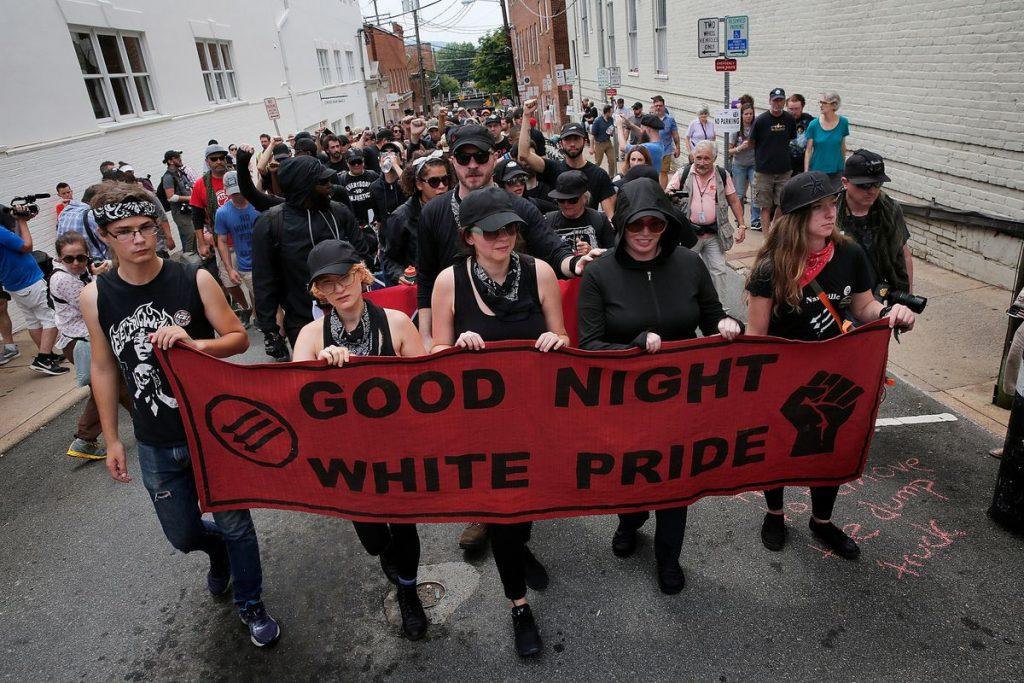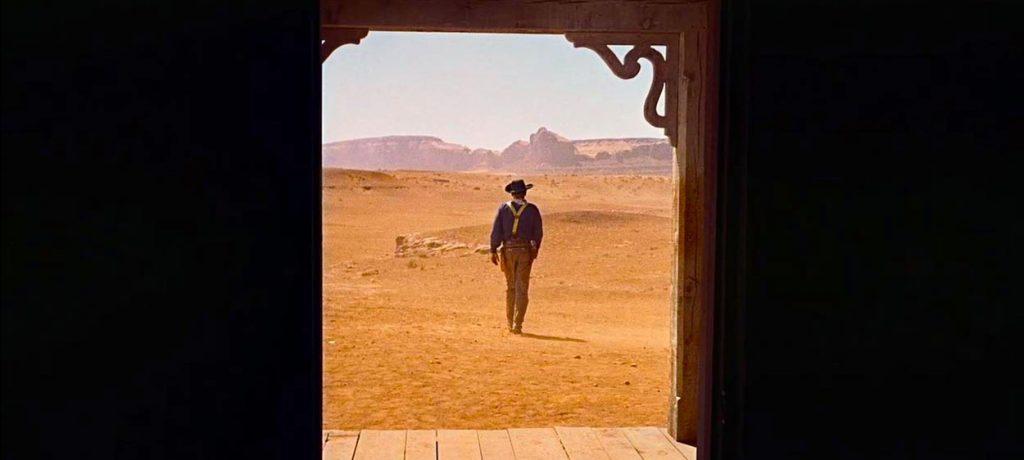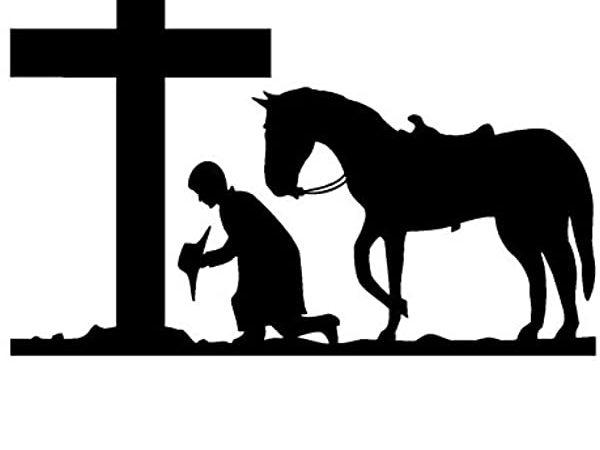“The Pardoned Sheriff’s Tale,” AKA “The Cowboy’s Last Stand”
I want justice. There’s an old poster out west that said, ‘Wanted, dead or alive.’
George W. Bush speaking on September 19, 2001, eight days after the attack upon the World Trade Center.
Act III, scene i
Setting: A town in Maricopa, County, Arizona.
As the act begins, the stage is dark. Rear screen projection: film footage. We see a thick, hardbound, heavily weathered book with a broken spine, lying in the desert. Amid waves of heat distortion, it rests on bright sand and pebbles that look so hot they could burn one’s skin. Wind begins to blow. Sand scatters across the book. The wind grows stronger. The cover of a book is blown open and the pages inside begin to tear and fly away. The pages flutter and fill the air, swirling like a flock of alarmed birds.
Dissolve to the text of the 14th amendment to the Constitution of the United States.
“All persons born or naturalized in the United States and subject to the jurisdiction thereof are citizens of the United States and of the State wherein they reside. No State shall make or enforce any law which shall abridge the privileges or immunities of citizens of the United States; nor shall any State deprive any person of life, liberty, or property without the due process of law; nor deny to any person within its jurisdiction the equal protection of the laws.”
Stage Direction: A spotlight illuminates Sheriff Joseph Arpaio. He seems to be speaking to someone whom we cannot see.
Sheriff Arpaio: All these people that come over, they could come with disease. There’s no control, no health checks or anything. They check fruits and vegetables. How come they don’t check people? No one talks about that. They’re all dirty.
(A pause.)
I can’t just surrender. I can’t start something and then surrender for political reasons. I just don’t do that and that comes back to me, why I keep running when I should probably take it easy, even though I have no hobbies, and enjoy the rest of my life.
(A pause.)
This is the Sheriff you’re talking about, with a gun and a badge that enforces the law. Nothing is going to stop me from cracking down on illegal immigration as long as the laws are there.
(A pause.)
If they can come after me, they can come after anyone in this country.

(On July 31, 2017, in federal court, Sheriff Joseph Arpaio is found guilty of criminal contempt, having refused to comply with two prior rulings in 2008 and in 2010 that found he had engaged in the illegal practice of racial profiling in violation of the Civil Rights Act of 1964. The court now finds that Arpaio not only broke the law: he also did so knowingly and consistently, even after he had already been found guilty of said crime. This constitutes criminal contempt of the court.
By breaking these laws, by acting as the lawman who is above the law, he has fulfilled his wish. He has become the proverbial so-bad-he’s-good, so-good-he’s-bad sheriff from the Western movies he loves.
A law enforcer contemptuous of the law.
A vigilante with a badge.
He seems to see no irony in this.
He is scheduled to be sentenced on October 5, 2017.)
Arpaio: I see no irony in this.
Stage Direction: Spotlight out on Sheriff Arpaio.
Scene ii
Stage Direction: Spotlight up on Fox News personality Sean Hannity. We hear him mumbling in preparation for his nightly show. He sorts through the major storylines of the evening, adjusting his tone, facial expression, finding the right accents of outrage on pre-selected punchlines. Going over the rhythm, the escalation, the crescendo and the pass-off to Laura Ingrahm for her angle at 10:00.
(That afternoon, on Friday, August 25, 2017, President Donald Trump, using his presidential power to exonerate a criminal, has announced the pardon of Sheriff Joseph Arpaio via Twitter. He has saved Sheriff Arpaio from serving the sentence for the crimes of which he was found guilty. Trump calls him an “American patriot.” One can now defy a federal court order and face no consequence. The President has demonstrated that the power of the pardon is, for him, a political weapon to be used however and whenever he sees fit.
Like protects like. One lawless bigot with authoritarian ambition looks out for another. Trump times his pardoning tweet for maximum primetime play, knowing that the country would be watching another disaster unfold, that of Hurricane Harvey, as its winds tear through the Gulf of Mexico and its rains bear down on the state of Texas.)
Stage Direction: Hannity puts in the earpiece that allows his producers to talk to him during the broadcast, in case some breaking news takes place during the show. The voices of the producers tell him that there will be an intermittent split-screen during his hour, Hurricane Harvey on the right wreaking havoc on the Gulf coast of Texas, the Arpaio story developing on the left, with screen shots of Trump’s pardon tweet.
He looks heavenward, blinking, with a pleading, prayerful expression and summons a biblical verse, from Mark 16:15-16, rising from childhood memory. He recites it to himself, awkwardly.

Hannity: “Go into all the world and proclaim the gospel to the whole creation. Whoever believes and is baptized will be saved, but whoever does not believe will be damned.”
Stage Direction: Hannity looks down, begins mumbling again, running through the show’s main points. Everything he needs must be on the tip of his tongue. He fixes on the phrase “abuses of the judiciary,” ready for when he refers to Judge Susan Bolton, of the United States District Court for the District of Arizona, Phoenix Division. Bolton was the one who ruled that Sheriff Arpaio had knowingly broken previous federal injunctions against racial profiling and was therefore in criminal contempt of court.
Hannity smiles briefly, wryly, pleased with himself. He knows that his show is the most important stop on the MAGA gravy train, and Arpaio is giving his first interview to him, just like everyone always who falls into the gravitational thrall of Trump.
Hannity hears his producer’s voice in his ear.
Producer: Going live, Sean, in 3, 2, 1….
Stage Direction: Boost spotlight on Hannity. His heavy, made-for-TV make-up makes him look plastic.
Hannity: Tonight we have the first exclusive, post-pardon interview with Sheriff Joseph Arpaio.
Stage Direction: We hear the sound of Sheriff Arpaio’s muffled voice. He is trying to join the interview via telephone, with some apparent difficulty. Sounds of a keypad being pressed.
Sheriff Arpaio (voice only): Hello, hello? Is this thing….
Hannity: First of all, Sheriff, I’m very relieved for you. You are 85 years old. You have dedicated your entire life to public service. You came under fire for obeying what are the laws of the land. I applaud the president for what he did tonight. It was the right thing to do.
Arpaio: I love that President. I will be with him until the end.
Stage Direction: Spotlight on Hannity out.
Scene iii
Stage Direction: A spotlight up on Donald Trump. He stands behind a podium bearing the Presidential Seal.
Trump: We cannot allow all of these people to invade our country. When somebody comes in, we must immediately, with no judges or court cases, bring them back from where they came. Our system is a mockery to good immigration policy and law and order.
(Under the guise of law and order, individuals who have committed no known crime are arrested based solely on the color of their skin, and detained without formal charge.
With the stroke of an executive pen, so an argument going viral goes, children born in the United States to immigrant parents shall no longer be considered as natural citizens of the United States.
With the stroke of an executive pen, children are separated from their parents, some only months old, detained in overcrowded facilities, with no beds, no consistent access to running water. Parents lose contact with their children, children have no way of knowing where their parents have gone.)
Trump: Let’s lock ‘em up….
Stage Direction: Sound of crowd chanting “Lock them up, lock them up, lock them up.” Trump beams, gives two big thumbs up and then nods along with the chant. Sound grows louder as he makes a fist and waves it around to the side of his chest, urging the crowd on. Suddenly: the noise of a needle being dragged across a vinyl record. Silence. Trump looks around, confused, with a “what’s happened?” gesture, frowning, hands out, palms up. Spotlight out.
Scene iv

Stage Direction: The entire stage is lit for the first time. Very bright. The backyard of an unassuming house in one of the outermost suburbs of Phoenix. The yard abuts the open desert. The sky is brilliant blue. A line of laundry, sheets and clothes hung out to dry. A wading pool. A picnic table, featuring a generous mound of churros. A barbecue. The house, with a sliding glass door, behind.
This is the home of Deputy R., of the Maricopa County Sheriff’s Office, and his wife, Jennifer. Deputy R. is stationed at the barbecue, the top open. He holds a beer in one hand, grilling tongs in the other. Jennifer goes in and out of the house, putting food and utensils on the picnic table. Their children, Joshua and Olivia, are playing, jumping in and out of the wading pool. Deputy G., who is Deputy R.’s best friend and partner on the force, stands beside Deputy R., offering grilling advice, also with beer in hand. Deputy G.’s wife, Melissa, is helping Jennifer set the table. Their son Bradley plays with Joshua and Olivia.Roy, Deputy R.’s older half brother, is pretending to be a bullfighter, furling out an imaginary cape, sashaying away from an imaginary, charging bull. He has brought his own cooler of high octane stuff, which he has been diligently plowing through. He is loaded. He does a silly dance, wiggling his butt, drawing the children’s attention. They gather around him, laughing, wiggling their butts too. He sits down at the picnic table, his back to Jennifer and Melissa, and takes out his phone. He shows a picture on his phone to the children. Jennifer and Melissa watch him closely.
Melissa (to Jennifer, inaudible to Roy): I’m sure it’s fine.
Jennifer: I hate him. (A pause.) I can’t believe I let him pick up the kids that day.
Roy (briefly noticing Jennifer and Melissa as they walk back and forth): There go my two darlings….
Melissa: Still doing Uber? What’s he been doing?
Jennifer: Drives a shuttle out at the airport. Speed limit there is 35. He’s still going to kill somebody.
Melissa: You fixed up the couch for him.
Jennifer: He’s not going anywhere. He’s parked it until tomorrow morning.
Roy, who has been busily chattering at the children, finds the photograph he’s been looking for. He hoots and shows it to them. Deputy R., at the barbecue, hears him and turns around. He hands the grilling tongs to Deputy G. and walks, slowly, over to Roy. He puts his own can of beer down on the picnic table and puts his hands in his pocket. The children, sensing that some kind of adult exchange is about to start, step back, wander away.
Deputy R.: What do you have there, Roy?
Roy: A beautiful memory.
Deputy R. takes the phone from Roy, worried about what the children might see, and looks at the photograph of an Arab woman selling ornate, colorful silks in a crowded market in the middle east.
Deputy R. Kabul. Again? Really Roy, do you really, really want to….
This prompts Roy to tell a story that he has told countless times before, about how he and a small band of fellow soldiers stationed in Kabul stole away for the afternoon, against strict orders from the upper-ups, and wandered the streets of the city. They went shopping for souvenirs in the souk for their mothers and their sisters, to bring gifts home, silks and slippers, like they were just tourists on vacation. But then they found a place and smoked some opium, and they drank some tea. And then, not knowing exactly where they were or what time it was, or how to get back to the battalion, they went on a fucking raging rampage in the souk, and that became a thing, that lead to a controversy, and a hearing, and to a diagnosis, and to a discharge. Every once in a while, he digs out the printout his military lawyer gave him, of the court proceedings that describe the scene at the souk, because he can’t remember, the blood and the gunshots and the woman who sold those silks. He has no memory of it, any of it. But that’s how he met Patrick, Patrick Haab. They go back, way back, back to Kabul and to the souk, before Patrick went apeshit at the truck stop on the Interstate with the illegals, back before Sheriff Joe, and the posses, and the armed patrols, and Sheriff’s trouble with the law. Roy finishes off the story and his can and reaches down into the cooler.
Deputy R. glares at Roy, not sure what to say or how to contain what’s coming. And Roy, another open can in hand, is off to the races again, back to where he left off in an “as I was saying…” rant from earlier that afternoon. The subject: defunding the police. Roy declares that he has unique insight into the matter because he is part of an actual “police family.” Because even though he didn’t make it onto the force, because of what happened in Kabul, but his little brother did. Roy he took another path, Joe’s path. He knows what it’s like. Because those antifas or whatever sure don’t. Those little bitches. Defund the police. Fuck.
Deputy R: Tell me all about it. I really appreciate your opinion on this matter. This makes my day.
Roy does not pick up on Deputy R.’s sarcasm. Assuming he is in friendly territory, expressing a popular opinion, Roy takes this as his big green light. Defund the police. Fuck. He’s going to tell it like it is this time. Straight talk express, like McCain. He’s going to spell it out once and for all and he just doesn’t care this time what anyone has to say about it. It’s a free country, still. Sort of. His little brother asked for it so here it comes. Well, in his opinion if the police get defunded it’s not because they do too much but because they do too little. Especially now that Sheriff Joe is gone. He misses Sheriff Joe. That’s just the goddamned truth.
Deputy R: You know him, I guess. Sheriff Joe.
Roy demands to know what kind of wise ass thing to say is that? Of course he doesn’t know the guy personally. Unlike his big shot little brother, of course, he has never met the man personally. It was the idea. What he stood for. That is the point.
Deputy R: What idea was that?
Roy insists that big shot little brother knows goddamned fucking well what that idea was. That we stop letting Mexicans fuck with us all of the time. And China too, but mainly, around here anyway, it’s Mexico. In his opinion all of those lawyers and whiners and stuff came in and his bigshot little brother just said: okay, go ahead and take my balls. I wasn’t using them, anyhow. Yeah it sucked that Sheriff threw his big shot little brother and his numbnuts sidekick standing over there by the barbecue under the bus for awhile about Patrick, but he had a point. Sheriff had a point. Now everybody’s prosecuting, they’re trying to dump Sheriff in jail for doing his job and everything is mightily fucked. Everyone should have the Sheriff’s back. That’s what you get around here when you try to do your job.
Stage Direction: Deputy G. walks away and goes into the house. As he does so, he ignores both Jennifer and Melissa, who try to speak to him. Deputy G. quickly comes back out, carrying a slightly yellowed, folded newspaper in his left hand.
Roy (almost groaning): Here we go again. God help us all.
Stage Direction: Blackout.
Scene V

Stage Direction: Spotlight up on Attorney General Jeffrey Beauregard Sessions, the first Attorney General of the Trump Administration.
Sessions: I would cite you to the Apostle Paul and his clear and wise command in Romans 13, to obey the laws of the government because God has ordained the government for his purposes. Orderly and lawful processes are good in themselves. Consistent and fair application of the law is in itself a good and moral thing, and that protects the weak and protects the lawful.
(Without warning, guided by a New Testament injunction, authorities seize immigrant children, already separated from their parents and siblings, from their foster homes in Idaho, Kansas, Iowa, Delaware, North Carolina. ICE and Border Patrol authorities take them to tent cities in Texas.)
Sessions (repeating himself, word for word): I would cite you to the Apostle Paul and his clear and wise command in Romans 13, to obey the laws of the government because God has ordained the government for his purposes. Orderly and lawful processes are good in themselves. Consistent and fair application of the law is in itself a good and moral thing, and that protects the weak and protects the lawful….
Stage Direction: As Sessions speaks, his voice falls steadily more quiet. In turn, the melody of “Taps” begins and grows louder. It is joined by the sound of a church Choir, first humming, and then singing the lyrics.
Choir (offstage): Day is done, gone the sun. From the lake, from the hills, from the sky…
(Like protects like. One lawless bigot with authoritarian ambition looks out for another. As the United states embraces this divinely sanctioned immigration policy, the President prepares for a meeting with North Korean dictator Kim Jong Un.)
Trump’s Voice, Offstage: He wrote me such beautiful letters, we fell in love, okay? Such beautiful letters, one after another, they were such great letters. When we meet, we are going to have a great conversation, the kind of conversation no one has ever had before, and we will be safer and we will be smarter.
Choir:…safely rest. God is nigh.
(Pardner, pardoned. Viva vigilante.)
Stage Direction: Spotlight on Sessions snaps out.
Scene VI:
Stage Direction: Lights up, strong, bright. The backyard barbecue at Deputy R.’s and Melissa’s house.
Deputy G. unfolds the paper and thrusts it at Roy. He points to an article, below the fold, in the corner of the page.
Headline: “Officer in Haab Incident Again Subject of Investigation.” The when, where, how, and who: one Jorge Vasquez dies of heart attack in back seat of Sheriff department’s squad car shortly after arrest, November 16, 2010. Vasquez arrested following incident of public urination. Suspected undocumented alien status later denied, citizenship confirmed. Underlying medical conditions also confirmed: high blood pressure, advanced diabetes. 63 years old. Formerly of Nogales, Mexico. Naturalized 1983. Arizona Migrant Rights Coalition alleges depraved indifference on part of deputy who drove Vasquez to booking office, dead on arrival, instead of emergency room. Officer denies misconduct. Investigation to follow.
Deputy R. pretends to closely examine the newspaper. He turns it over and over, seeming to look for something.
Deputy R. (heavily ironic): Where’s the follow up? What did they find out?
Roy (sighing): There was no investigation. They never did one. Everyone knows that.
Deputy R. launches into how there was constant pressure to pick up as many illegals as possible. Sheriff couldn’t stop, didn’t want to stop himself. Wanted Haab in the rearview. Deputy R. spots an old guy taking a leak behind a gas station while he’s out on patrol one day. Old guy is wearing greasy overalls, like a mechanic. Deputy R. puts him in the car. Public urination. Exposing himself in public. The guy is terrified. His eyes are big. Not just wide, but actually big. Puffy. Talking a mile a minute. Can’t understand a word. He bangs on the plexiglass. He’s squirming around back there, punching his own chest. It’s obvious he’s gasping for air. Something is really wrong with the guy. And yeah, Deputy R. didn’t drive him to the hospital. He knew he should have but he didn’t. Deputy R. just didn’t. In fact, Deputy R. turned the radio up as loud as it could go so he couldn’t hear what was going on back there. And he made sure not to look. Didn’t look until he opened the door at headquarters, thinking as he drove that this way he could honestly say that he really didn’t see what was going on back there, he could testify to that.
Deputy R. (pretending as if he is being examined in court): I didn’t see it. Oh? Get serious, Deputy. You didn’t know that Mr. Vasquez was having a heart attack? You didn’t know that you drove a dead man around in the back seat of your car for at least 10, maybe 15 minutes? (A pause.) But no one asked me that. No questions. I didn’t even have to play dumb. Sheriff Joe saw to that.
Stage Direction: Deputy R. wears an untucked, a button up shirt, untucked. With his right hand, he pulls the shirt back, takes out the service pistol that he’s shoved down at the waist, and puts it in Roy’s hand.
Deputy R: There. You got it. That’s what all this is about, anyway. It’s yours, big guy. Let’s see what you can do. Let’s hear this hombre’s iron balls go clackity, clack, clack.
Stage Direction: Stunned by the sight of the gun, Deputy G. takes a step forward, still holding grilling tongs. Melissa and Jennifer both shout, look for Joshua, Olivia, and Bradley. They are nowhere to be found.
Deputy R. (to Roy but loudly enough that Deputy G. can hear): Here’s how this is going to get resolved. In a few seconds, my sidekick numbnuts over there is going to call in that there’s been an altercation and that you are in possession of an officer’s weapon and that you are inebriated and that you are threatening to use said weapon.
Roy: Oh fuck, oh fuck….
Deputy R. (over his shoulder): Call it in.
Roy: You’re not really gonna…
Deputy R. (to Roy): This time of day, they’ll be here in, I don’t know, five minutes, maybe. And who do you think they’re gonna believe when they get here, you fucking dipshit. Who are they going to believe? And with your record. This is bad, Roy. You are in a very, very unenviable situation.
Stage Direction: Roy tries to hand the gun back to Deputy R. but Deputy R. won’t take it. Roy desperately looks over at Deputy G. Deputy G. remains motionless.
Roy: You’re not really gonna…
Stage Direction: Roy looks down. He’s urinated onto himself, a stain spreading from his groin, running down a pant leg. He tries to cover himself with his hand and looks around, as if for a change of clothes. He sees the clothes and sheets hanging on the laundry line and starts stumbling toward them. He drops the gun, halfway. He grabs the sheet from the line, and half falls to the ground. He’s crying. He pulls the sheet over his shoulders, his head down. Deputy R. walks toward him, picks up the service pistol on his way, puts it back at his waist. He stands over Roy, looking down, making the sign of the cross.
Deputy R: Don’t worry. You’re fine. I pardon you. I pardon you. I pardon you.
Scene VII:
Stage Direction: The screen projection of the 14th amendment dissolves to a meteorological image of Hurricane Harvey, looped, repeating, moving across the Gulf of Mexico and crashing into North America.

(By accepting Trump’s pardon for the crimes he committed, Sheriff Joseph Arpaio admitted his guilt. Before he retires his badge for good, perhaps with “Taps” playing in his head, he battles the law one last time, trying to scrub the tarnish of guilt from his once shiny Sheriff’s badge.
It’s Sheriff Joe’s last stand.)
Stage Direction: Spotlight up on Sheriff Joe, once more.
Sheriff Arpaio: Vacate these rulings. Clear my name.
Stage Direction: Silence.
Sheriff Arpaio: (louder, agitated, repeating himself): Vacate these rulings. Clear my name!
Stage Direction: Spotlight illuminates Judge Susan Bolton.
Judge Bolton: The power to pardon is an executive prerogative of mercy, not of judicial record keeping. To vacate all rulings in this case would run afoul of this important distinction. The Court found Defendant guilty of criminal contempt. The President issued the pardon. Defendant accepted. The pardon undoubtedly spared Defendant from any punishment that might otherwise have been imposed. It did not, however, “revise the historical facts” of this case.
Stage Direction: Both spotlights fade slowly, slowly to dark.
Unseen Choir (speaking, off stage): A western fable thus unfolds on America’s biggest and smallest screens, in VistaVision and Technicolor, by tweet and emoji.
Stage Direction: The rear projection dissolves from Hurricane Harvey to one final image: John Wayne, lean and lumbering, in the last shots of The Searchers, moving from darkness to light, walking away into the desert.

Roll credits.

